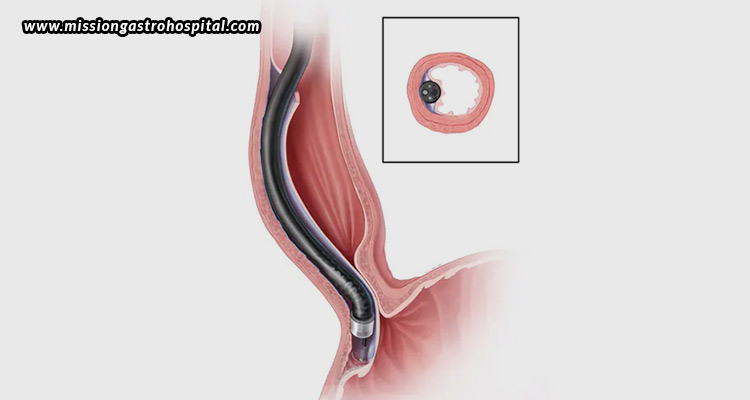If you have been diagnosed with an oesophageal motility disorder, such as achalasia or diffuse oesophageal spasm, your physician might suggest an innovative treatment known as POEM (Peroral Endoscopic Myotomy). This minimally invasive procedure provides substantial relief from difficulties in swallowing and is rapidly becoming the treatment of choice. However, as with any medical intervention, it is crucial to be well-informed before moving forward. This blog addresses key questions to discuss with your doctor regarding POEM treatment and examines the potential risks involved, along with how experienced specialists work to mitigate them. With the right information, you can approach your treatment with assurance and tranquillity.
Questions to ask your doctor about POEM
- Am I a suitable candidate for POEM?
Begin by determining if POEM is suitable for your particular condition. While POEM is notably effective for treating achalasia, it is also being utilized for uncommon oesophageal disorders like Jackhammer oesophagus and diffuse oesophageal spasm. Your physician may conduct diagnostic assessments, including oesophageal manometry to analyse muscle contractions, endoscopy to eliminate other potential issues, and barium swallow tests to evaluate oesophageal function. Be sure to inquire how your test results may affect the recommendation for POEM.
- What is the procedure like, and how should I prepare?
Familiarizing yourself with the POEM procedure can help alleviate anxiety. The treatment is performed under general anaesthesia and involves the insertion of an endoscope through the mouth to sever the muscles causing swallowing difficulties. Consider asking: What preparations are necessary in the days leading up to the procedure? Will I need to fast or modify any medications? How long will I be under anaesthesia? Proper preparation is essential for a smooth procedure and recovery.
- What are the expected outcomes of the procedure?
It is crucial to have realistic expectations regarding the outcomes. Many patients report significant improvements in swallowing and a decrease in chest pain, although individual results can differ. Ask your doctor about the typical duration of relief, the likelihood of symptom recurrence, and the success rate at their facility. This information will help you form a clearer picture of what to expect in the long run.
- What will recovery look like?
POEM provides the advantage of a quicker recovery time compared to conventional surgeries, with most patients being discharged within 24 to 48 hours. Important questions to consider include: What dietary restrictions will I have after POEM? When can I resume work or regular activities? Will follow-up appointments be necessary? Understanding what to expect during recovery will help you plan accordingly and minimize stress.
- What are the potential risks or complications?
While POEM is regarded as a safe and minimally invasive procedure, it is crucial to be aware of the potential risks involved. These may encompass infection, bleeding, or, in rare instances, oesophageal perforation. Inquire about the following: What complications should I monitor for at home? How does your hospital manage potential complications? What is your complication rate for this procedure? These questions will assist you in assessing both the procedure itself and your physician’s expertise.
Why expert care matters for a POEM treatment
Although POEM is recognized as one of the safest methods for addressing oesophageal disorders, it is crucial to be aware of its associated risks and, more importantly, how skilled medical professionals mitigate these risks.
Associated risks
- Oesophageal perforation: A significant concern with POEM is the potential for oesophageal perforation, which refers to a small tear in the oesophagus. While this complication is uncommon, it can be serious if not addressed quickly.
- Infection or pneumonia: Similar to any procedure involving the gastrointestinal system, there is a slight risk of infection, especially if stomach contents inadvertently enter the lungs during the process.
- Bleeding: Minor bleeding may occur when the oesophageal muscles are incised, but it is typically well-managed.
- Postoperative reflux: POEM may compromise the function of the lower oesophageal sphincter, occasionally resulting in acid reflux. This is a frequent side effect but can usually be controlled with medication.
How specialists minimize the risks involved
- For oesophageal perforation: The use of advanced imaging techniques and real-time endoscopic visualization ensures precision during the procedure. Surgeons skilled in POEM techniques can effectively identify and avoid vulnerable areas within the oesophageal wall. After the procedure, imaging tests are conducted to monitor for any early indications of leakage.
- For infection or pneumonia: Prior to the procedure, you will be advised to refrain from eating for several hours to ensure your stomach is empty. General anaesthesia will be administered, and measures will be taken to protect your airway and prevent aspiration. Antibiotics may be provided either before or after the procedure as a preventive measure.
- For bleeding: The use of immediate cauterization tools on the endoscope, along with continuous monitoring of blood pressure and oxygen levels, ensures patient safety during and after the POEM procedure. Recovery will involve close observation to maintain stable vital signs.
- For postoperative reflux: Patients are typically prescribed proton pump inhibitors to decrease stomach acid production. After the POEM procedure, lifestyle changes are recommended to help prevent reflux. Follow-up appointments will be arranged to monitor progress and adjust treatment as necessary.
The overall success and safety of the POEM procedure are largely influenced by the expertise and experience of the healthcare provider performing it. Selecting a facility with a proven history in POEM procedures can significantly lower the risk of complications. It is essential to find centres that focus on gastroenterology and minimally invasive endoscopic techniques, employ cutting-edge imaging and surgical technology, and provide personalized care with comprehensive pre- and post-operative assessments. Highly qualified specialists at these facilities adhere to rigorous safety protocols, ensuring the procedure is conducted as safely as possible. They also provide education to patients on recognizing warning signs and understanding when to seek medical assistance, thereby enhancing the overall treatment experience.
For those in need of specialized care in Ahmedabad, Mission Gastro Hospital stands out as a reputable facility for POEM treatment. The hospital boasts a skilled team of gastroenterologists and utilizes cutting-edge endoscopic technology to provide accurate diagnoses, safe procedures, and thorough follow-up care. Renowned for its patient-focused philosophy, effective communication, and impressive success rates, Mission Gastro addresses both common and uncommon oesophageal motility disorders. From achalasia to more intricate issues such as Jackhammer oesophagus, the hospital delivers dependable, minimally invasive treatments aimed at enhancing swallowing comfortand overall quality of life; thus proving to be the most successful centre for POEM treatment in Ahmedabad!








